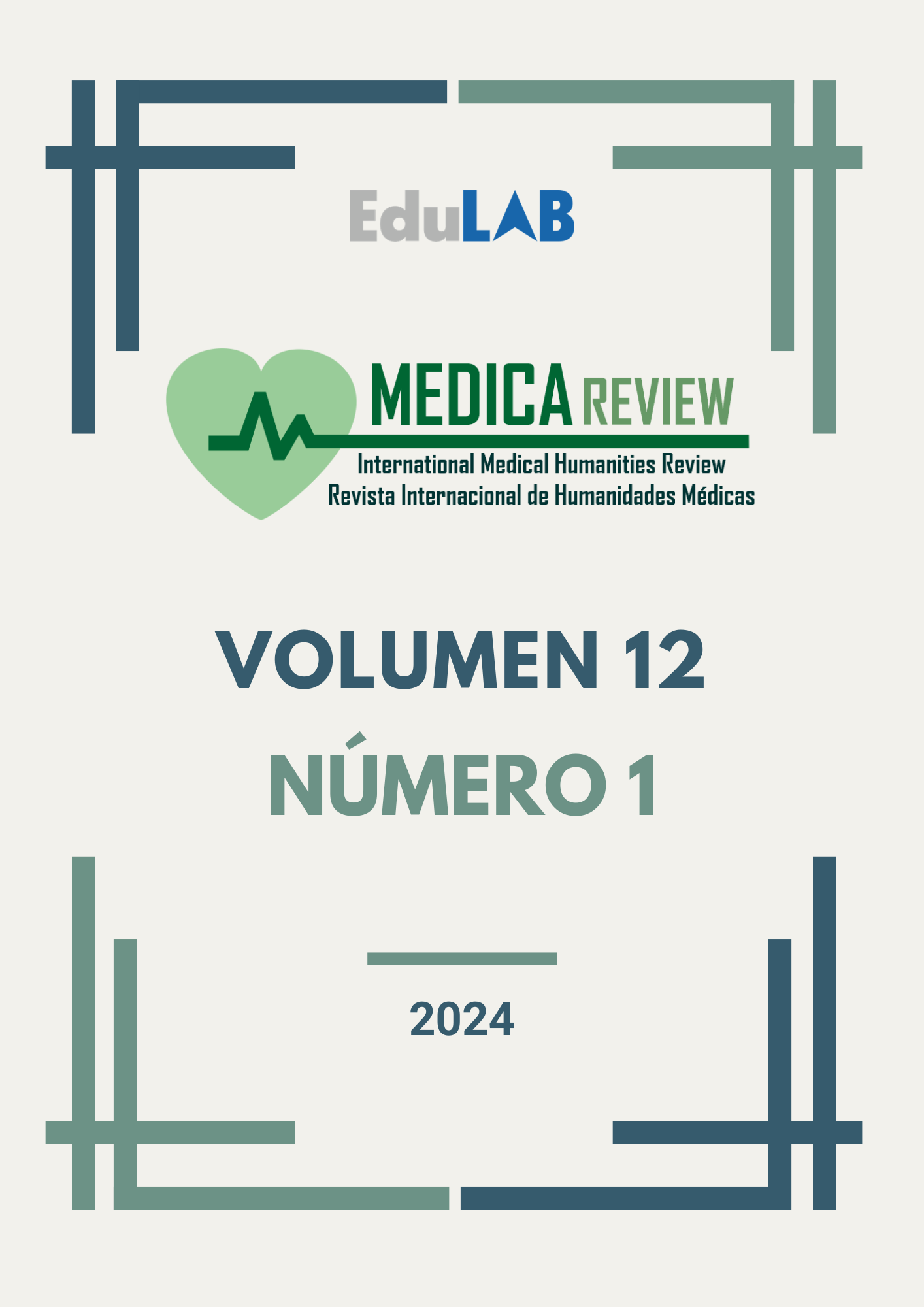Lactation and obstetric violence: towards lactation sovereignty
DOI:
https://doi.org/10.62701/revmedica.v12.5417Keywords:
Breastfeeding, Obstetric violenceAbstract
Numerous studies on obstetric violence have established it as a significant risk factor for human breastfeeding, with global breastfeeding rates failing to reach even 50% in infants under 6 months of age. In response to this, the objective of this article is a philosophical analysis on the intersection between obstetric violence and breastfeeding, presenting, firstly, a narrative review of the literature addressing how obstetric violence critically impedes breastfeeding; and secondly, a propositional essay aimed at critiquing and re-founding epistemic concepts on breastfeeding in general and obstetric violence in particular.
Global Statistics ℹ️
|
1031
Views
|
701
Downloads
|
|
1732
Total
|
|
References
Alive & Thrive. (2022). COST OF NOT BREASTFEEDING TOOL. URL: https://www.aliveandthrive.org/en/the-cost-of-not-breastfeeding-tool
Ausona Bieto, M. (2013). “Lactancia materna de larga duración o sobre cómo la tradición innova”. En Maternidades, procreación y crianza en transformación / Carmen López Matheu (ed. lit.), Diana Marre (ed. lit.), Joan Bestard Camps (ed. lit.): 57-78.
Ausona Bieto, M., Brigidi, S., & Cardús Font, L. (2017). Lactancias, capital y soberanía alimentaria. La falaz escasez de la leche humana. Dilemata, 25, 135–142. URL: https://www.dilemata.net/revista/index.php/dilemata/article/view/412000138.
Baker, Phillip et al. (2023). The political economy of infant and young child feeding: confronting corporate power, overcoming structural barriers, and accelerating progress. The Lancet 401-10375, 503 – 524. doi:10.1016/S0140-6736(22)01933-X
Batram-Zantvoort, S., Wandschneider, L., Razum, O. et al. (2023). A critical review: developing a birth integrity framework for epidemiological studies through meta-ethnography. BMC Women's Health 23, 530. doi:10.1186/s12905-023-02670-z
Beck, CT. (2015). Middle Range Theory of Traumatic Childbirth: The Ever-Widening Ripple Effect. Glob Qual Nurs Res, 18, 2, 2333393615575313. doi:10.1177/2333393615575313.
Chooniedass, R., Tarrant, M., Turner, S., et al. (2022). Factors associated with breast-feeding initiation and continuation in Canadian-born and non-Canadian-born women: a multi-centre study. Public Health Nutrition 25-10-: 2822-2833. doi: 10.1017/S1368980021004699
De Chateau, P., Wiberg, B. (1977). Long-term effect on mother-infant behaviour of extra contact during the first hour post partum. II. A follow-up at three months. Acta Paediatr Scand 66-2,145-51.
Doherty, Tanya et al. (2024). Stemming commercial milk formula marketing: now is the time for radical transformation to build resilience for breastfeeding. The Lancet e 401-10375: 415 – 418. doi:10.1016/S0140-6736(23)00095-8
Editorial The Lancet. (2023). Unveiling the predatory tactics of the formula milk industry. The Lancet 401-10375, 409. https://doi.org/10.1016/
Edmond, K. M., Zandoh, C., Quigley, M., Amenga-Etego, S., et al. (2006). Delayed Breastfeeding Initiation Increases Risk of Neonatal Mortality. Pediatrics 117, 380-386.
e-lactancia. (2024). Inundación. Tsunami. URL: https://www.e-lactancia.org/breastfeeding/flood-inundation-deluge/synonym/.
Flanigan, J. (2016). Obstetric autonomy and informed consent. Ethical Theory and Moral Practice 19,-1, 225–44. doi:10.1007/s10677-015-9610-8.
Frazier, C.M., Dharod, J., Labban, J., Raynor, A.N., Villasenor, M. et al. (2021). Breastfeeding: How is it related to food insecurity and other factors among low-income mothers? Health Care Women Int. 44-3, 234-245. doi:10.1080/07399332.2021.1929992.
Gómez Fernández-Vegue, M. (2015). Lactancia materna en niños mayores o “prolongada”. Comité de Lactancia Materna de la AEP, Asociación Española de Pediatría. URL: https://www.aeped.es/comite-nutricion-y-lactancia-materna/lactancia-materna/documentos/lactancia-materna-en-ninos-mayores-o
Grummer-Strawn, L.M., Lutter, C.K., Siegfried, N., Rogers, L.M., Alsumaie, M., et. Al. (2024). World Health Organization (WHO) guideline on the complementary feeding of infants and young children aged 6-23 months 2023: A multisociety response. J Pediatr Gastroenterol Nutr. 79-5, 1084-1086. doi:10.1002/jpn3.12363
Guareschi, A.P., França, D., Sassaki, R.L., et al. (2021). Correlación de la economía del país con el destete precoz: revisión integradora. Revista Família, Ciclos de Vida e Saúde no Contexto Social 9-3, 651-662. doi:10.18554/refacs.v9i3.4873
Hamidou Togo, A., et al. (2019). Culture of Methanogenic Archaea from Human Colostrum and Milk. Nature Research 9:18653. doi:10.1038/s41598-019-54759-x.
Hansen, M.N., Bærug, A., Nylander, G., et al. Challenges and Successes: The Baby-Friendly Initiative in Norway. (2021). Journal of Human Lactation 28-3, 285-288. doi:10.1177/0890334412444162
Honoré, C. (2008). Elogio de la lentitud. Barcelona, RBA.
IPOV RESPECTFUL-CARE. (2024). Laws: A Hidden Form of Gender-Based and Institutional Abuse. URL: https://respectfulcare.eu/laws/
Keklikián, R. I. (2020). Nuevos paradigmas para asistir embarazo, parto y recién nacido en el siglo XXI. Clínicas Perinatológicas Argentinas, ASAPER.
Lau, Y., et al. 2007. Influence of Intimate Partner Violence During Pregnancy and Early Postpartum Depressive Symptoms on Breastfeeding Among Chinese Women in Hong Kong”. Journal of Midwifery & Women's Health 52-2, e15-e20. doi:10.1016/j.jmwh.2006.09.001
Leboyer, F. (2010). Por un nacimiento sin violencia. Madrid, Mandala Ediciones S.A.
Leite, T.H., Marques, E.S., Mesenburg, M.A., Freitas da Silveira, M., Leal, M.D.C. (2023). The effect of obstetric violence during childbirth on breastfeeding: findings from a perinatal cohort "Birth in Brazil". Lancet Reg Health Am. 16-19,100438. doi:10.1016/j.lana.2023.100438.
Loreto, T.M., Kuhn Dos Santos, J.F., Nomura, R.M.Y. (2022). Understanding the opinion of doctors on obstetric violence in Brazil to improve women's care. Midwifery 109-25, 103294. doi:10.1016/j.midw.2022.103294.
Lugones, M. (2008). Colonialidad y género. Tabula Rasa 9, 73-10. URL: https://www.redalyc.org/articulo.oa?id=39600906
Martín-Badia, J., Obregón-Gutiérrez, N., Goberna-Tricas, J. (2021). Obstetric Violence as an Infringement on Basic Bioethical Principles. Reflections Inspired by Focus Groups with Midwives. Int J Environ Res Public Health 18(23):12553. doi:10.3390/ijerph182312553.
Martin-de-las-Heras, S., Velasco, C., Luna-del-Castillo, J.D., Khan, K.S. (2019). Breastfeeding avoidance following psychological intimate partner violence during pregnancy: a cohort study and multivariate analysis. BJOG 126, 778–783. doi:10.1111/1471-0528.15592
Martínez Casares, J.A., Massó Guijarro, E., Cid Expósito, G. (2024). Análisis cualitativo de la publicidad institucional en la promoción de la lactancia materna: sesgos de género y entornos lactantes corresponsables. RESP [en vías de publicación].
Martínez-Galiano, J.M., et al. (2021). “The magnitude of the problem of obstetric violence and its associated factors: A cross-sectional study”. Women and Birth 24-5, e526-e536. doi:10.1016/j.wombi.2020.10.002
Massó Guijarro, E. (2013). Lactancia materna y revolución, o la teta como insumisión biocultural: calostro, cuerpo y cuidado. Dilemata 11: 169-206. URL: https://dialnet.unirioja.es/descarga/articulo/4195869.pdf.
Massó Guijarro, E. (2015). Lactivismo contemporáneo en España: ¿una nueva marea sociopolítica?”. Journal of Spanish Cultural Studies 16-2, 193-213. doi:10.1080/14636204.2015.1069074
Massó Guijarro, E. (2017). Mamar: Mythos y lógos sobre lactancia humana. Edición de Número Especial, Revista Dilemata 25. URL: https://www.dilemata.net/revista/index.php/dilemata/issue/view/26
Massó Guijarro, E. (2019). Leche, lactancia, lactivismo: del fluido al movimiento. Pikara Magacine 05/06/2019. URL: https://www.pikaramagazine.com/2019/06/leche-lactancia-lactivismo-del-fluido-al-movimiento/
Massó Guijarro, E. (2021). Lactancia humana en el Antropoceno: una urgencia pospandémica. MEDICA REVIEW. International Medical Humanities Review 9-2, 63–77. doi:10.37467/gkarevmedica.v9.3125
Massó Guijarro, E. (2023). La violencia obstétrica como injusticia epistémica: el parto en disputa. Salud Colectiva 19: e4464. doi:10.18294/sc.2023.4464.
Massó Guijarro, E. (2024). El lactario del mascarón de proa: la teta y el capital. El Salto 15/10/2024. URL: https://osalto.gal/lactancia/lactario-del-mascaron-proa-teta-capital.
Mena-Tudela, D. (2022). Violencia obstétrica y lactancia materna #25N2022. Blog APILAM, “Firma experta” 25/11/2022. URL: https://apilam.org/la-firma-experta/violencia-obstetrica-y-lactancia-materna-25n2022
Mena-Tudela, D. et al. (2020). Obstetric violence in Spain (Part I): Women’s perception and interterritorial differences. International journal of environmental research and public health 17-21, 7726. doi:10.3390/ijerph17217726
Downloads
Published
How to Cite
Issue
Section
License
Those authors who publish in this journal accept the following terms:
- Authors will keep the moral right of the work and they will transfer the commercial rights.
- After 1 year from publication, the work shall thereafter be open access online on our website, but will retain copyright.
- In the event that the authors wish to assign an Creative Commons (CC) license, they may request it by writing to administracion@edulab.es









